Review – “Return of the Jedi” – Novelization (1983)
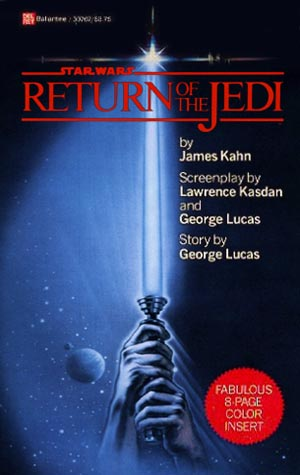 “The Rebel fleet has gathered all its forces into a single giant armada. The time is at hand when we can crush them, without mercy, in a single blow.” – Darth Vader
“The Rebel fleet has gathered all its forces into a single giant armada. The time is at hand when we can crush them, without mercy, in a single blow.” – Darth Vader
Two weeks before Return of the Jedi premiered in theaters, it was released as a novel written by James Kahn. Can you imagine having read the final chapter of the Star Wars trilogy before actually having seen the movie? I guess some people did that. What a strange thought. This novel is Kahn’s first and only contribution to the Star Wars universe.
Being a novelization of the movie, this book is pretty much what you’d expect. It’s the same story, and there isn’t much added to it. What little extra bits of information the book does give us are pretty great though, and they really made this novelization worth reading.
One thing I noticed right off the bat when I started reading was that I really liked Kahn’s writing style. I’m afraid I can’t really describe what exactly I liked about it. There’s just something about it that intrigued me and held my interest even though I already knew the entire story I was reading.
A few scenes that were deleted from the movie still appear in this book, to my delight. Most notably, we get to see Luke building his new lightsaber at the beginning of the story. It doesn’t flat-out say “Luke is building a lightsaber” but, he totally is. He assembles his lightsaber in a cave, and gives it to Artoo. Then, like in the movie, R2-D2 and C-3PO make their way off to Jabba the Hutt’s palace.
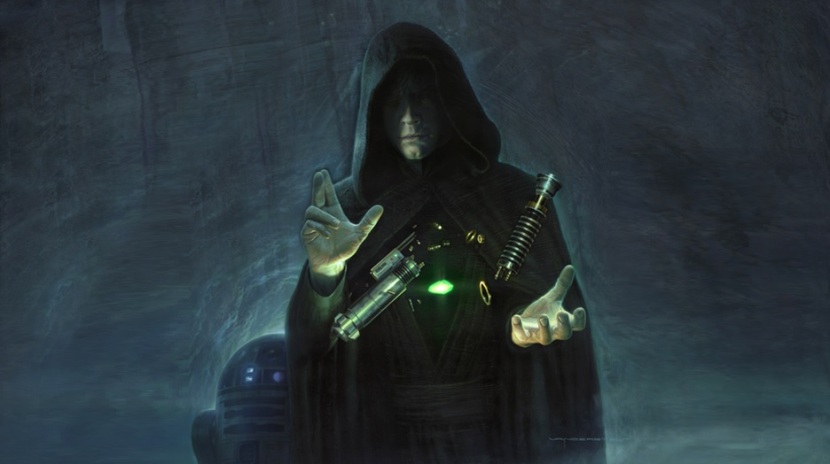
Speaking of Jabba, this book is, to my knowledge, the first time “Hutt” was ever spelled with two T’s instead of one. And, finally, he appears as we know him from the movies. He’s a big ol’ giant ol’ ugly ol’ slug. Not a human. Not a… yellow… guy… He’s normal Jabba the Hutt. However, when describing Jabba in the first chapter of the book, Kahn writes: “He had no hair–it had fallen out from a combination of diseases.” So, apparently, Jabba the Hutt had hair once. I can’t picture him looking anything but ridiculous with hair on his head, which is why I kind of love this random detail.
For me, the best parts of the book were parts where we got to get into the heads of the characters a little more. Through the narration we get to know and understand the characters better than we do in the film. For example, it is pretty obvious right away that Leia is in-tune with the Force (though she doesn’t know it), as there are many times throughout the entire story where she connects with the Force unknowingly. These are things that cannot be shown in a movie. We only learn about them through reading.
Another thing that this book did great that the film couldn’t do was describe to us Luke’s struggle with the dark side of the Force. The dark side is really starting to creep into Luke’s life here, and not just at the end of the book during his confrontation with Vader and the Emperor, but there are hints of darkness from the very beginning. Here’s an example:
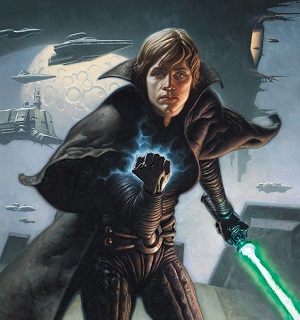 “[Luke] found Jabba despicable–a leech of the galaxy, sucking the life from whatever he touched. Luke wanted to burn the villain, and so was actually rather glad Jabba had refused to bargain–for now Luke would get his wish precisely. Of course, his primary objective was to free his friends, whom he loved dearly; it was this concern that guided him now, above all else. But in the process, to free the universe from this gangster slug–this was a prospect that tinted Luke’s purpose with an ever-so-slightly dark satisfaction.”
“[Luke] found Jabba despicable–a leech of the galaxy, sucking the life from whatever he touched. Luke wanted to burn the villain, and so was actually rather glad Jabba had refused to bargain–for now Luke would get his wish precisely. Of course, his primary objective was to free his friends, whom he loved dearly; it was this concern that guided him now, above all else. But in the process, to free the universe from this gangster slug–this was a prospect that tinted Luke’s purpose with an ever-so-slightly dark satisfaction.”
And then, a few pages later:
“The deck gunners were lining up . . . their shots for the coup de grace, when Luke stepped in front of them, laughing like a pirate king. He lit his lightsaber before they could squeeze off a shot; a moment later they were smoking corpses.”
Though still the clear hero and protagonist of the story, darkness is beginning to overtake the light, and Luke is enjoying it. Towards the end of the story this becomes much worse, as we realize how close Luke almost came to actually turning to the dark side while in the Emperor’s presence, like his father did at the end of the Clone War. “In this bleak and livid moment, the dark side was much with him.”
In the Expanded Universe, in a comic series set a few years after Return of the Jedi called Dark Empire, Luke actually does fall to the dark side for a short time before turning back to the light. I guess his struggle wasn’t over after the Death Star blew up.
This novelization includes another deleted scene from the movie of when Luke, Han, Leia, Lando, Chewbacca, R2-D2, and C-3PO are all walking back from Jabba’s palace to their ships through a sandstorm (and in the words of nine-year-old Anakin Skywalker: “Sandstorms are very, very dangerous!”). It doesn’t add much to the story, and it’s easy to see why it was cut from the movie, but it did offer some great moments and good dialogue. It was a welcome addition to the book for sure.
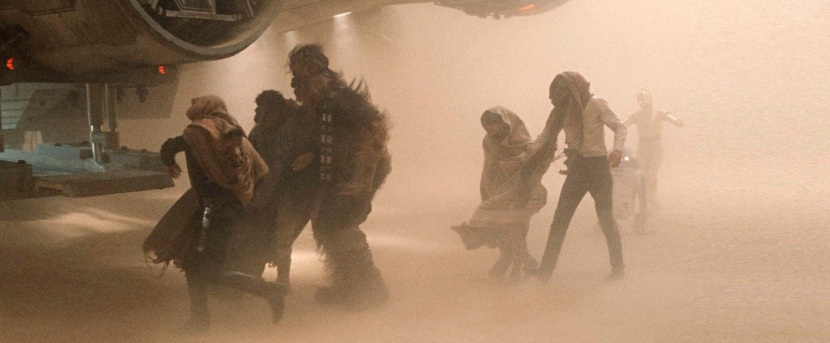
Many moments are expanded upon and leave us with some great new insights about the story. Early on in the book we learn more about Darth Vader’s desire to kill Emperor Palpatine and rule the galaxy in his stead, with his son at his side.
We learn that Obi-wan never told Luke about his real father because Yoda forbade him from revealing the truth to him.
When Obi-wan appears to Luke, he says “If I was wrong in what I did, it certainly wouldn’t have been for the first time. You see, what happened to your father was my fault.” Obi-wan blames himself for Anakin’s fall to the dark side. Like in the movie, Obi-wan tells Luke that he believed he could train Anakin as well as Master Yoda. He then says “My pride had terrible consequences for the galaxy.”
He regrets training Anakin. He was told not to train Anakin in The Phantom Menace, but he still did, against his own better judgment, because he promised Qui-Gon that he would. He trained the boy anyway, taught him about the Force and how to be a Jedi knight, and then Anakin became a Sith Lord. Obi-wan thinks this is all his fault. Man, he’s being pretty hard on himself.
The scene goes on, and it is one of my favorite scenes in the novel, because Obi-wan tells Luke more about Anakin than what he told in the movie:
You should not think of that machine as your father. When I saw what had become of him, I tried to dissuade him, to draw him back from the dark side. We fought . . . your father fell into a molten pit. When your father clawed his way out of that fiery pool, the change had been burned into him forever–he was Darth Vader, without a trace of Anakin Skywalker. Irredeemably dark. Scarred. Kept alive by machinery and his own black will . . .
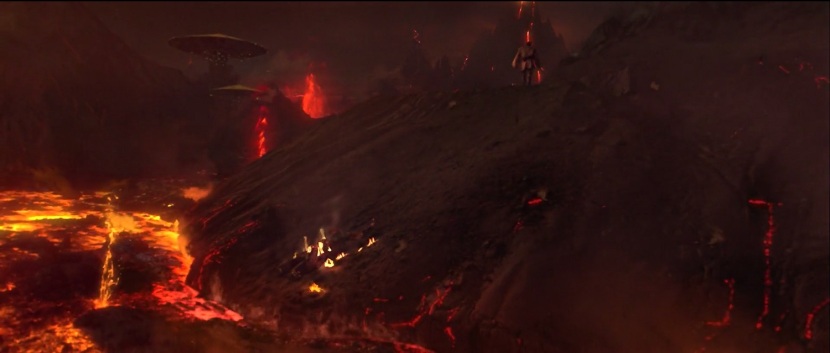
Sound familiar? Like how the novelization of A New Hope basically summarized the entire prequel trilogy in its prologue, this novelization of Return of the Jedi once again shows us just how much of the prequel trilogy George Lucas already had in mind when making the original trilogy. It’s pretty fascinating to me. And reading this really made the two trilogies feel more connected. Having old Ben Kenobi describe a scene to Luke from Revenge of the Sith is kind of awesome, especially since the book came out more than 20 years before Revenge of the Sith premiered in theaters.
One of my favorite things about reading these old novelizations of the original Star Wars trilogy is trying to pick out the differences between the films and the novels. Luke flew in Blue Squadron in the A New Hope novelization, Yoda was blue in The Empire Strikes Back novelization. Something had to be blue in this book that wasn’t blue in the movies, right?
Sadly, no.
But there were still a bunch of things that didn’t quite match up with what we see in the movie.
I’m gonna jump right to the biggest, most well-known difference: Obi-wan Kenobi and Owen Lars are brothers. Uncle Owen is Obi-wan’s brother, instead of Anakin’s stepbrother. There’s not much else to say about this. Obi-wan simply says “I took you to live with my brother Owen, on Tatooine.” That’s all that is said about it. Obi-wan and Owen are brothers in this version of the story.
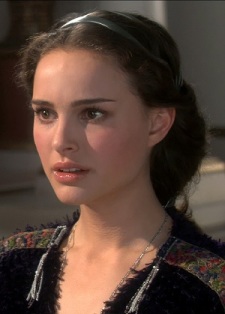 Which leads into the next big difference that I noticed: not only does Leia remember her mother, but Luke does too. Luke and Leia both somehow remember Padmé even though she was only alive for like the first five minutes of their lives. Apparently Padmé lived for much longer in this version of the story. When Obi-wan appears to Luke on Dagobah, he tells Luke a little about his mother. He says “When your father left, he didn’t know your mother was pregnant. Your mother and I knew he would find out eventually, but we wanted to keep you both as safe as possible, for as long as possible. So I took you to live with my brother Owen, on Tatooine . . . and your mother took Leia to live as the daughter of Senator Organa, on Alderaan.” Leia has many memories of her real mother. In this book it makes more sense than it does in the movies, now that we’ve seen the prequels.
Which leads into the next big difference that I noticed: not only does Leia remember her mother, but Luke does too. Luke and Leia both somehow remember Padmé even though she was only alive for like the first five minutes of their lives. Apparently Padmé lived for much longer in this version of the story. When Obi-wan appears to Luke on Dagobah, he tells Luke a little about his mother. He says “When your father left, he didn’t know your mother was pregnant. Your mother and I knew he would find out eventually, but we wanted to keep you both as safe as possible, for as long as possible. So I took you to live with my brother Owen, on Tatooine . . . and your mother took Leia to live as the daughter of Senator Organa, on Alderaan.” Leia has many memories of her real mother. In this book it makes more sense than it does in the movies, now that we’ve seen the prequels.
One thing I praised the novelization of The Empire Strikes Back for was how it depicted Vader’s relationship with the Emperor. In that book, Darth Vader was terrified of Emperor Palpatine. I loved that detail and hoped to see it expanded upon in this book. But, Vader doesn’t seem afraid of Palpatine in the slightest in this novelization. He respects him, but it doesn’t seem like he fears him. Though this is more true to the movies, I was hoping it would be different. I liked the idea that Darth Vader lived in constant fear of his Master.
During the confrontation between Luke and Vader on the Death Star, Luke tells Vader “You could not bring yourself to kill me before–and you won’t destroy me now.” This happens in the movie. It is a line most people would be familiar with. What is different, however, is that afterward the author goes to write “Twice before, in fact–to Luke’s recollection–Vader could have killed him, but didn’t. In the dogfight over the first Death Star, and later in the lightsaber duel on Bespin.” Seems accurate, right? Well, this one line shows that the Star Wars Expanded Universe was still not being acknowledged by official media at this point. If we take the Star Wars Expanded Universe into consideration, there was a third confrontation where Vader did not kill Luke in a duel on the planet Mimban, in the book Splinter of the Mind’s Eye.
Another thing that stuck out to me while reading was that the name “Palpatine” was used many times in this book, both in the narration, and in character dialogue. Despite the name also appearing in the novelization of A New Hope, the Emperor’s name is never once uttered in any of the three movies in the original Star Wars trilogy. For this reason, little-kid-me who was young Ani Skywalker’s age when The Phantom Menace was released had no idea that Senator Palpatine was the man who would become the Emperor. I don’t think I knew this until the trailer for Revenge of the Sith made it clear. Now it seems so obvious, but I was a kid at the time and the name “Palpatine” meant nothing to me. I find it interesting how often his name was used in this book.
I could keep going on, and mention every little thing I liked about this book, and talk about every little detail that I found interesting. I think I’ve already done that enough. But, I do want to say that my favorite part of the entire book is at the end, after Vader threw the Emperor to his death, when he asks Luke to take his mask off. This scene was written so beautifully, and was really enhanced by allowing us to get inside Anakin Skywalker’s head as he looks at his son for the first time with his own eyes.
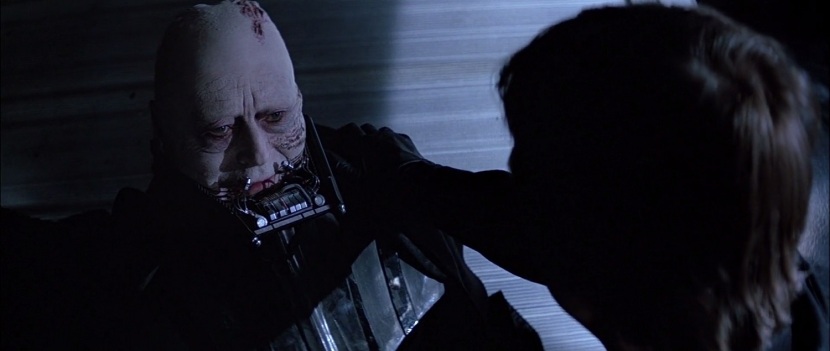
Tears fall down Luke’s face when he see’s his father’s real face for the first time. Anakin feels very self-conscious, and thinks Luke is crying in horror at the sight of his horribly scarred and sickly pale appearance. His mind starts to wander. He remembers what he used to look like: “striking, and grand, with a wry tilt to his brow that hinted of invincibility and took in all of life with a wink. Yes, that was how he looked once.” Ah, yes, just like Hayden Christensen!
These memories lead to more memories. Anakin thinks back to his time as a Jedi. He thinks about Padmé, and he thinks about Obi-wan. Then, he thinks about molten lava crawling up his back, and at that moment he stops, not allowing himself to think of such terrible things.
Anakin looks back up at Luke, and the scene is described like this:
“The boy was good, and the boy had come from him–so there must have been good in him, too. He smiled up again at his son, and for the first time, loved him. And for the first time in many long years, loved himself again, as well.”
Still believing that look is disgusted by his physical appearance, Anakin echos the words of Yoda, saying “Luminous beings are we, Luke–not this crude matter.”
The rest of the scene plays out like it does in the movie. But these extra details really made this scene so much more powerful. Knowing exactly what Anakin was thinking in these last moments of his life, knowing the memories that were coming to his mind and the emotions that he was feeling before he died made reading this small section of the novel a real treat. These are things we can’t be shown on film, and it is one of the rare moments where the novel really outshines the movie.
For whatever reason, I really enjoyed this novelization. I complained that the novelization of Empire Strikes Back didn’t really add anything new to the story, and this novel is guilty of the same thing in most instances, but there’s something about Kahn’s writing style that did a great job of pulling me in, even though I already knew the story. That, combined with the moments I’ve pointed out that let us get into the heads of the characters, which are the few moments that do provide us with extra details that the movies do not, makes for a genuinely entertaining read.
If you’re really just interested in getting “new” information, then this review is probably all you need to read, but if you’re just looking for a well-written novelization of a movie you like, then yes, definitely read this one. I certainly enjoyed it.